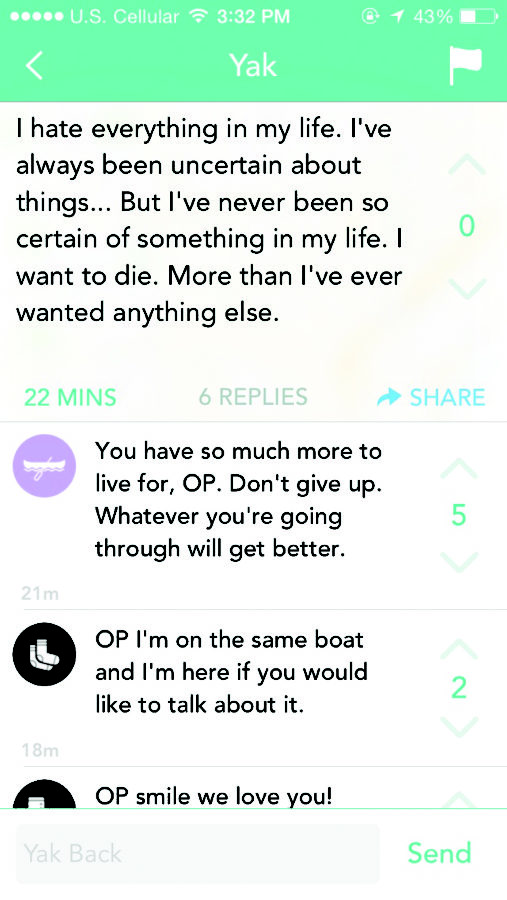Social media helps students find support
Students respond to anonymous Yik Yak post, hoping to offer reassurance to a user contemplating suicide.
October 7, 2015
Rylee sat alone in her room. All of her peers were at school, but she lay in bed, not moving, ignoring all of their messages and doing absolutely nothing.
When she was by herself, she drowned herself in her own thoughts, furthuring the extent of the depression she was feeling.
Rylee, a first-year student studying english at Iowa State, uses social media to express her feelings, whether it’s on her personal accounts or anonymously via Yik Yak.
Yik Yak is a popular app where people can make posts their area can see without having to worry about people knowing who is saying it. Users can also up-vote, down-vote and comment on posts.
“It is more of a place to vent,” Rylee, who wished not to disclose her last name because of privacy reasons, said in regard to Yik Yak. “You can tell someone what is going on, but you don’t have to tell anyone in particular.”
Rylee is one of the many students on campus who deals with depression and has been living with it for quite a few years now. Rylee was 15 years old when she realized she was depressed.
“Depression runs in my family, so it wasn’t really a shock when my grandma said, ‘Hey, I think something is wrong with you. I just noticed that you are always either really high and in a really good mood, or you’re lower than low.’ I didn’t even notice it until she said something,” Rylee said.
In high school, Rylee posted some negative things about herself on Tumblr, a social media blog site. Rylee had missed a few days of school and wasn’t communicating to any of her usual friends, which is when Ashley Green, a freshman in journalism and communication and an Iowa State Daily reporter, and her other friends decided they needed to pay her a visit and make sure she was doing alright.
“It got to a point where we needed to go check on her to make sure that she was OK,” Green said.
When Rylee’s friends went to go check on her at her house, Rylee’s mother answered the door.
“My mom was so shocked to see them there,” Rylee said.
Rylee was equally as surprised to see they showed up.
“At the time, I just wanted to kind of be alone, but they just wanted to make sure I was OK, which was obviously very, very thoughtful,” Rylee said.
After making the visit, Green felt like it was a good decision.
“Her reaction let us know that we did the right thing,” Green said. “She seemed surprised, but in a way where she wanted it to happen and seemed glad that we came.”
According to the National Institute of Mental Health, about 30 percent of college students nationwide reported feeling ‘so depressed that it was difficult to function’ within the past year. Alexus Ferree, junior in psychology, said many different things can trigger stress for college students.
“College is a stressful time for students because for many of them, they are on their own, away from their immediate support at home,” Ferree said. “It can be stressful to deal with the change in time management and studying required in high school to what is required of you in college. Finances are also stressful to deal with.”
Stress can influence depression in many ways, but the low level of endorphins that go along with stress seems to be a big factor in depression.
“If people don’t have that ‘feel good’ hormone in their body, it can be just as much of a physical issue as it is emotional,” Ferree said. “Without endorphins, it’s hard to be happy with your life because it can feel like you’re in a constant rut of sadness.”
Sometimes people just need to know someone cares. To aid in that effort, the ISU Police Department does welfare checks for students around campus.
A welfare check is when a friend or family member calls the police, usually at his or her non-emergency number, and asks them to check on a person when they may be concerned about their safety.
“We receive requests in a lot of different ways,” said Carrie Jacobs, deputy chief at ISU Police.
Jacobs explained that even though they recommend calling the dispatch number, 515-294-4428, the police department also responds to social media and email notifications. But those methods might not be noticed immediately since they are not monitored 24/7.
While the number of welfare checks the police department does varies, Jacobs said it deals with anywhere from one to five requests per week. With the growing population of the student body, the department has been getting more requests than ever before.
When handling welfare checks, the police department has a process to go through.
First, when the request is made, the dispatcher will question the person making the request to be sure that there are legitimate reasons to go check on the person in question. After that, the department will send an officer to investigate the situation until it receives a satisfactory conclusion and comes in contact with the person.
Jacobs said if a person is worried about someone, he or she should never hesitate to call.
“At the end of the day, we are ultimately here to serve our students, staff and faculty, and ensure their safety,” Jacobs said.
Rylee still has her occasional struggles with depression. She didn’t really know how to explain what it’s like when depression hits, other than it just happens. She discussed an instance that happened a few weeks ago when she was supposed to be going to her classes for the day.
“You just don’t want to do anything,” Rylee said. “I just laid in bed, and my roommates asked me if I had classes, and I said yes and then just rolled over and pretended to go back to sleep.”
Rylee said that while depression is still present in her life, she’s happier some days than others.
“I want to say that sometimes it’s better than others,” Rylee said. “I’m still very high when I’m high and very low when I’m low. There’s really no happy in-between. I don’t want to say that I am all better because everybody has their bad days, but I guess I could say I’m a little bit better.”







